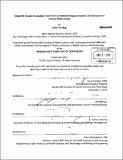Nonprofit disease foundation investments in biotechnology companies : an evaluation of venture philanthropy
Author(s)
Fielding, Sarah (Sarah Tabbals)
DownloadFull printable version (4.192Mb)
Other Contributors
Harvard University--MIT Division of Health Sciences and Technology.
Advisor
Jeff Behrens and Fiona Murray.
Terms of use
Metadata
Show full item recordAbstract
In the past decade, the practice of venture philanthropy, defined in this research as the provision of capital by a nonprofit entity to a for-profit company, has become an increasingly common asset allocation strategy for nonprofit disease-focused foundations.' Both nonprofit organizations and biotechnology firms alike have praised these funding relationships as instruments that help enable, de-risk, and ultimately accelerate the development of new therapies. However, data on the composition and performance of these venture philanthropy investment portfolios remains scarce. While the field of venture philanthropy is too young to have robust outcome data as of yet, we attempted to understand the methodologies for venture philanthropy portfolio construction, the historical mix of projects funded, and the performance of these portfolios thus far. We hypothesized that our independent assessment of grant portfolio composition would be congruent with stated portfolio policy. Instead, we found that organizations did not have a predetermined asset allocation framework against which to compare their investments. We collected data on industry-funding portfolios from three major participants in venture philanthropy in three different disease areas: the Cystic Fibrosis Foundation (CFF), the Juvenile Diabetes Research Foundation (JDRF), and the Michael J. Fox Foundation for Parkinson's Research (MJFF). Data was gathered from organization websites, annual reports, and financial filings. Interviews were conducted with grant program executives at each of the three organizations. While it was not possible to confirm or reject our hypothesis on the basis of portfolio congruence, we were able to show that in the absence of articulated portfolio policy, investment choices may not be aligning with stated program aims to fund earlier-stage, risky projects.
Description
Thesis (S.M.)--Harvard-MIT Division of Health Sciences and Technology, 2011. Cataloged from PDF version of thesis. Includes bibliographical references (p. 50-52).
Date issued
2011Department
Harvard University--MIT Division of Health Sciences and TechnologyPublisher
Massachusetts Institute of Technology
Keywords
Harvard University--MIT Division of Health Sciences and Technology.